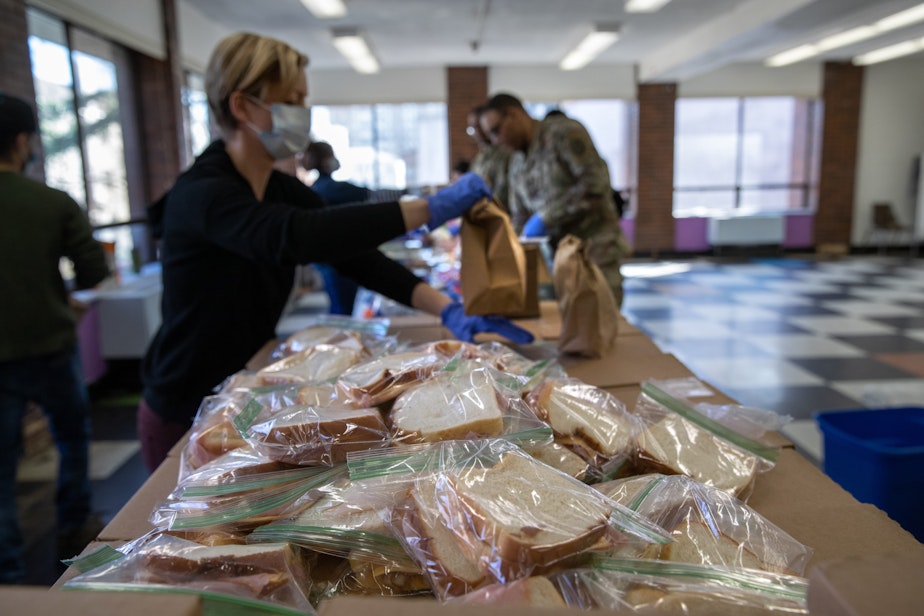Sing-Alongs, Mask Donations And Food Deliveries: Acts Of Kindness During The Coronavirus Crisis

Find Jamil Zaki’s kindness challenge here.
Coronavirus framed in a different light: we’ll talk about acts of kindness popping up in communities around the country.
Guests
Jamil Zaki, professor of psychology at Stanford University. Director of the Stanford Social Neuroscience Lab. Author of “The War for Kindness: Building Empathy in a Fractured World.” (@zakijam)
Andrea Asuaje, co-host, co-producer and reporter for Kind World, a radio series and podcast. (@aasuaje)
Sponsored
We Put A Call Out To Listeners: ‘What Acts Of Kindness Have You Seen (Or Been A Part Of) In Your Community?’Here’s How Listeners Responded:
Rachel from Milton, Mass. is a physician in the Boston area. She’s been helping deliver much-needed protective equipment to fellow health care workers. Listen below.
Larry from Bay City, Florida is an Uber driver who, in between rides, has switched up his route a bit lately. Listen below.
Elizabeth, who works for the Manlius Pebble Hill School, an independent K-12 in Syracuse, New York, says her school is conducting a kindness experiment with students. “Our pre-K teachers are taking the big words attached to COVID-19, like contagious, exponential and viral, and defining them for their students by applying them to kindness,” she says. “To see if kindness, too, is catching.” Listen below.
Brenda from Lodi, Wisconsin called attention to the actions of a thoughtful and creative teacher in her community. “This amazing kindergarten teacher Kerrie Rashid, together, I believe, with the help of her self-isolating teenage sons, proceeded to reach out to each of her kindergartners by painting and placing a yard sign at each of their homes,” she says. Listen below.
Sponsored
Gregory from Staten Island, New York needed some help with his groceries recently, when a stranger stepped in. Listen below.
Pat from Yucaipa, California lost her husband in a car accident about a year and half ago. Things have been difficult since then, she says. But during the coronavirus outbreak, her neighbors and friends have been taking care of her. And that’s made all the difference. “All [the] people who are helping those of us who are older and high risk, thank you, thank you. You’re a godsend,” she says. Listen below.
Jesse from Westport, Connecticut enjoys hiking – and poetry! He shared with us a poem. Listen below.
From The Reading List
Exerpt from “The War for Kindness: Building Empathy in a Fractured World” by Jamil Zaki
Sponsored
Excerpted from “The War for Kindness: Building Empathy in a Fractured World” by Jamil Zaki © 2019 by Crown, an imprint of Penguin Random House. Reprinted with the permission of the publisher, Penguin Random House. All rights reserved.
Exerpt from Jamil Zaki’s “The War for Kindness: Building Empathy in a Fractured World” — “Thankfully, the Roddenberry hypothesis—and the centuries of thought it represents—is wrong. Through practice, we can grow our empathy and become kinder as a result.
“This idea might sound surprising, but in fact it is supported by decades of research. Work from many labs, including my own, suggests that empathy is less like a fixed trait and more like a skill—something we can sharpen over time and adapt to the modern world.
“Consider our diet and exercise habits. Humans evolved in an environment where exercise was constant and sustenance was scarce. In response, we developed a taste for fat, protein, and rest. Now many of us are inundated with fast food and rarely required to exert ourselves. If we allowed our instincts to take over, we could indulge ourselves into an early grave. But many of us don’t accept this; we fight to stay healthy, adjusting our diets and going to the gym because we know it’s the wise thing to do.
“Likewise, even if we have evolved to care only in certain ways, we can transcend those limits. In any given moment, we can turn empathy up or down like the volume knob on a stereo: learning to listen to a difficult colleague, or staying strong for a suffering relative. Over time, we can fine-tune our emotional capacities, building compassion for distant strangers, outsiders, and even other species. We can free our empathy from its evolutionary bonds.”
Sponsored
The Washington Post: “‘Social distancing’ shouldn’t mean losing human connection” — “I’m writing this from home. If you normally work at an office, I bet you’re reading it from home. The coronavirus has shut down businesses, schools, movie theaters and festivals. Stanford, where I teach, has temporarily morphed into an online university.
“World events plant new buzz terms into our public consciousness. This time, it’s ‘social distancing’ — efforts to keep people healthy by keeping them apart. Social distancing can be many things, including canceling NBA games, screening nursing home visitors and urging people to avoid public places when possible.
“All of these are vital strategies for slowing contagion. They also push against our deep instincts for togetherness, and can worsen our emotional well-being during already trying times.”
Stanford News: “Instead of social distancing, practice “distant socializing” instead, urges Stanford psychologist” — “Social distancing – voluntarily limiting physical contact with other people – has been vital to help slow the spread of the novel coronavirus. But it’s important that people remain connected – otherwise a long-term mental and physical health crisis might follow the viral one, warns Stanford psychologist Jamil Zaki.
“Here, Zaki, an associate professor of psychology in Stanford’s School of Humanities and Sciences and director of the Stanford Social Neuroscience Laboratory, discusses strategies to stay connected, starting with the reframing of ‘social distancing’ to ‘physical distancing’ to highlight how people can remain together even while being apart.
Sponsored
“Zaki’s research examines how empathy works and how people can learn to empathize more effectively. He recently authored The War for Kindness: Building Empathy in a Fractured World.”
This article was originally published on WBUR.org. [Copyright 2020 NPR]
